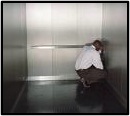Social Anxiety is one of the most common forms of anxiety. It is characterized by persistent anxiety and fear of embarrassment or negative evaluation from others when in social situations such as speaking, writing, eating in front of others, or asking teachers/work supervisors for help. Examples of commonly feared “Performance Situations” would include the following:
• Speaking in public
• Writing or eating in front of others
• Playing a musical instrument in front of others
• Playing competitive sports
• Entering a room full of people
• Using a public restroom
Examples of commonly feared “Social Interactions” would include the following:
• Socializing
• Going to a party
• Making “small talk”
• Dating
• Asking for directions, or help when interacting with authority figures
Those who suffer from Social Anxiety find that they spend a great of time worrying about all of the “what ifs” that could occur in the near future. I use the following metaphor when working with individuals who have this condition. Picture a typical “remote control” device used for our household TV’s, DVD players, etc. Pay particular attention to the buttons labeled “fast forward”, “rewind”, “stop”, “play”, and “mute”. People who suffer from depression frequently press the “rewind” button. That is, they seem to always be replaying in their mind all of the negative events in their life which have contributed to their depressed mood states (e.g., “the horrible manner in which my stepdad treated me”, “the unfair manner in which I was treated by my teachers in school”, “my friends always betrayed me”, etc.). In other words, their thoughts are consumed with the past. Those with chronic worry and anxiety disorders, keep pressing the fast forward button. Unfortunately, what they see during this screening are all of the future events that will no doubt go wrong (e,g, “My upcoming job interview will not go well”, “The talk I need to give will result in extreme social humiliation”, “If I go to that party, people will evaluate me as being socially incompetent”, etc.).
Individuals who evidence Social Anxiety display fear to either specific social situations which typically involve some form of performance-based interactions, such as public speaking. Others show a more generalized fear of several situations, including both social performance, as well as social interactions as a whole. This anticipatory anxiety leads to several forms of avoidance behaviors, and thus interferes significantly with the person’s normal daily routine, occupational or academic functioning, and social relationships. These features are what differentiates social anxiety from normal shyness.
The Center for Anxiety & Chronic Worry provides a short-term, evidence-based cognitive-behavior therapy program designed to help the person with Social Anxiety to learn to press the “stop” button, such that their negative, irrational thoughts are replaced with more realistic appraisals of everyday situational demands. I also help my patients to learn to press the “mute” button on their emotional remote control in a way that helps them to learn to mute their typical response to automatic negative ways of thinking, thus allowing themselves to sit back, relax and calmly press the “play” button”, for the purpose of enjoying not only a more productive life with respect to their everyday social interactions. For more information regarding Social Anxiety, please visit the Obsessive-Compulsive Foundation and the Anxiety & Depression Assocation of America Web Sites.
SOCIAL ANXIETY
CENTER FOR ANXIETY & CHRONIC WORRY
937 Tahoe Blvd. Ste. 205
Incline Village, NV. 89451
Phone: 775.831.2436
Copyright © 2014-2021: Center for Anxiety & Chronic Worry
All rights reserved: Barry C. Barmann, Ph.D.
937 Tahoe Blvd. Ste. 205 Incline Village, NV. 89451
Tel. 775.831.2436
